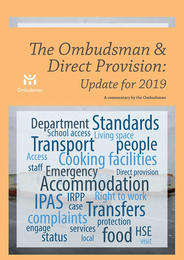Irish Ombudsman Peter Tyndall has again expressed his concerns over the unsuitability of accommodation in Direct Provision. He said that the highly contagious nature of the COVID-19 virus has highlighted how unsustainable it is to have three or more people, who are not from the same family, living in the same room for a significant amount of time.
In Ireland, asylum-seekers and their children are accommodated in residential institutions, under a reception system known as ‘Direct Provision’. The system meets the basic needs of food and shelter while their claims for refugee status are being processed.
Due to an upsurge in applicants, the capacity of the current Direct Provision centres to accommodate asylum seekers was exceeded. As a result, many people are placed in emergency accommodation such as hotels, guesthouses and bed & breakfast without first going through the normal screening process.
My Tyndall was speaking after the publication of his annual commentary on his experience of dealing with complaints from those in the direct provision system. It’s Mr Tyndall’s third commentary since it was confirmed that his Office has jurisdiction to investigate direct provision complaints.
Ireland’s Ombudsman said that the McMahon report - the recognised benchmark for direct provision services - had criticised the Department of Justice and Equality’s use of a definition from the 1966 Housing Act as the minimum space required for a bedroom. The measurement was little more than the space required for a double bed. However, the Department continued to use the definition. In response to the Ombudsman, the Department said that after the COVID-19 pandemic it intends to move towards having no more than three people who are not family members sharing accommodation.
The number of people in direct provision increased by 30% during 2018, and by a further 16% by early 2020. Staff from the Ombudsman’s Office visited 26 accommodation centres in 2019 including some unannounced visits. The Office witnessed a 10.5% increase in the number of complaints made (from 152 in 2018 to 168 in 2019). Complaints concerned the length of time in emergency accommodation, transfers to other accommodation, access to schools for children, food facilities, and access to GP services and medical cards.
Mr Tyndall said that the most significant change he saw in 2019 was the increase in the number of applicants for international protection temporarily living in emergency accommodation in hotels, guesthouses, and bed and breakfast accommodation. At the start of 2020 there were 1,524 people in 37 different locations across Ireland.
He said: “Current Direct Provision accommodation is not appropriate for anything other than short-term stay. Emergency accommodation is even more inappropriate. It is unacceptable that people who have sought refuge here can find themselves in accommodation that is entirely unsuitable for a prolonged period – up to 16 months and longer in some cases.”
In relation to the procurement of future accommodation centres Mr Tyndall welcomed confirmation by the International Protection Accommodation Service (IPAS) that it is examining the feasibility of moving towards a capital investment approach rather than the current practice of adapting existing buildings.
He commended the work of IPAS and other agencies in responding to threats from COVID-19, including moving over 300 people out of emergency accommodation. However, it was the physical constraints of current accommodation centres, and how applicants for international protection in the direct provision sector were being treated, which was of most concern to him.
Source: Office of the Ombudsman, Ireland

